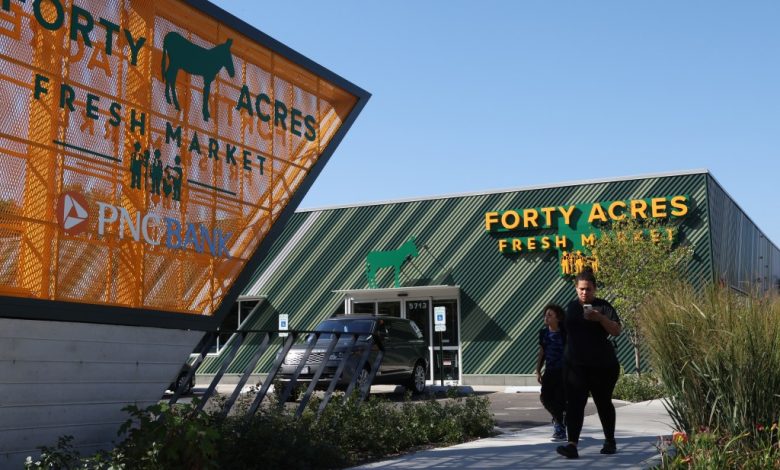Forty Acres, Chicago’s only Black-owned grocery store, opens

On a recent Thursday afternoon, Liz Abunaw was doing it all. Adjusting milk prices, running to the PNC Bank next door for $3 worth of pennies, stocking Spindrift sparkling waters, and flashing each customer with a “please come again” smile.
Forty Acres Fresh Market in Chicago’s Austin neighborhood was officially open, and the nuances of running a full-service grocery store were on full display.
“I didn’t dream of becoming a grocer, I wanted to be an MTV DJ,” Abunaw said with a laugh, begrudgingly repricing milk so the cartons nearing the sell-by date get picked up faster. “But I think a good business should solve a problem.”
Forty Acres is an expansion of Abunaw’s community-focused effort to offer fresh produce via home deliveries and pop-up markets. The brick-and-mortar is now the only Black-owned grocery store in Chicago. And Abunaw is intentional about making that known.
“Anyone can shop at Forty Acres, but make no mistake about it, I created this store as a Black woman for a Black neighborhood,” Abunaw said.
She wanted a name with cultural meaning recognizable to Black people, as “40 acres and a mule” was an unfulfilled promise by the U.S. government to grant freed slaves land after the Civil War. Its reversal left Black Americans landless and forced many families into sharecropping, and the phrase became a symbol of injustice and lost opportunity. The store logo is a mule, designed by a local art student.
“Ultimately, the beginnings of food come from the earth. So the name Forty Acres is rooted in agriculture, which is the basis of food, and it is a very specific reference for a very specific people,” she said.
On Thursday, a spirited customer, Marcus Jones, was excited to support a Black-owned business.
“Maybe this will bring us together more and we can get another Black Wall Street going,” Jones said, while picking up some ground meat. “I’m still waiting for my 40 acres and a mule.”
Though she is a natural shopkeeper, owning a store wasn’t Abunaw’s original goal. A New York native, she graduated from Cornell University and, after a decade at General Mills, moved to Chicago for business school at Booth.
It was during this time that the impetus for Forty Acres was born.
While in school, she also worked for Microsoft and lived in the South Loop. She said she could walk to multiple grocery stores such as Target, Trader Joe’s, Jewel — “it was an embarrassment of riches,” she laughed.
But one day, she was in the Austin neighborhood and needed cash. She couldn’t find a bank, she started looking for a place to make a purchase and get cash back — maybe a grocery store. She struck out there, too.
“That’s when the ‘wheel started to turn’ — something that I thought would be simple, wasn’t simple. What is this?” Abunaw said. “When I live in these predominantly white areas, I can find whatever I want, but now in a Black neighborhood, I can’t? It’s just harder.”
When she was laid off from Microsoft months later, Abunaw revisited an idea that was prompted by her Austin experience in the fall of 2016. With her grocery expertise, she launched Forty Acres’ first pop-up market in 2018 at the Sankofa Cultural Arts Center, providing affordable fresh produce on the West Side.

“I always say, ‘When the only tool in your tool belt is a hammer, everything looks like a nail.’ And the only tool in my tool belt seems to be grocery,” Abunaw laughed, joking that she came to Chicago “to get the (expletive) out of grocery.”
Now, she stocks her store’s shelves using a three-tier pricing system. For granola, customers pick from a premium option: Ms. P’s gluten-free granola at about $11; a middle tier, Nature Valley granola at about $5; or a value option, a private label brand from Certco that’s $2 less. Nearly every product — from cookies and chips to bread, jams, towels, and soap — is priced this way.
At the back of the store, Martell Cammon, the head of prepared foods, and Bradbury Catlow, head cutter in the butcher department, try to find ways to cater to customer tastes while also reducing waste.
“We’ve already started bringing in goat because there were a lot of Caribbean, Jamaican and Hispanic families that said if you bring in goat, we are going to have it,” Catlow said, adding that goat is not a guarantee regularly, but customer interests will continue to inform buying decisions. “Something that I’ve noticed is that people don’t understand that we’re able to cut things in-house per their necessities and their needs, but we won’t know until somebody starts engaging and talking to us.”
Over by the stove, Cammon was making a giant vat of beef chili. He said they often turn extra produce into cooked foods, such as pressed sandwiches or soup, to extend the shelf life and keep the section interesting. The prepared foods section also has a hot bar with three rice bowl options and room for customization.
Abunaw said the staff working in harmony has created an environment in which both employees and customers can thrive. A customer recently compared Forty Acres to Trader Joe’s in size, energy and organization. She joked it was the happiest day of her life.
A grocery store can only do so much
Abunaw said her store isn’t intended to solve food insecurity in Austin or the West Side, but that it will make fresh, healthy food more accessible in an area with limited options.
“Food insecurity is different than food access, and I think that people flip the two all the time,” she said. “I think that people exaggerate that Austin has no grocery stores; (people) not liking them is a different thing.”
Man-Yee Lee from the Greater Chicago Food Depository, which has partnered with Forty Acres over the years, said food insecurity is an impact of a lack of access to food that can be made worse in urban areas where, for instance, procuring fresh and healthy food is not a realistically walkable task.
“We are part of the food emergency response space — food banks, food pantries — Forty Acres is retail, it’s an actual business, but that doesn’t mean we can’t have the same mission of trying to feed our neighbors,” Lee said. “The other part is what she’s doing is helping strengthen communities by bringing business into a historically disinvested area and for us, that addresses the root causes of hunger.”
Michael Strode, a Garfield Park resident who was shopping at Forty Acres on Thursday, said he was “incredibly happy” walking into the grocery store, especially on the heels of the many South and West Side store closings in recent years. Strode said the Aldi closure in West Garfield Park in 2021 hurt his community, leaving about 15,000 residents without a nearby grocery store and worsening food access issues.
In 2022, an Aldi store in Auburn Gresham, located at 7627 S. Ashland Ave., permanently closed without warning. The closure came days after the reopening, just over a mile away, of a Save A Lot store, which the Sun-Times reported had temporarily closed due to a rat infestation.
There’s also a Save A Lot in West Garfield Park, less than four miles away from Forty Acres. Strode said the city-funded program has failed on its promises to offer quality groceries in neighborhoods historically lacking fresh food options. Sometimes, there’s even expired milk or meat on the cooler shelves.
The closest full-service grocery stores to Forty Acres are Pete’s Fresh Market in Oak Park and Leamington Foods in South Austin, both around 1.2 miles away. And a couple of smaller, general merchandise stores are less than a mile away, but offer a sparse supply.
Strode said he’s already shopped at Forty Acres several times and will continue.
”It’s really time that this community has resources that are community-owned and community-focused,” Strode said.
In-store nutrition access
Abunaw is also emphasizing nutrition access — not just food access — with a nutrition corner at the front of the store adjacent to the checkout lanes. The program is in partnership with Foodsmart, a national tele-nutrition and foodcare platform, that will offer customers nutrition guidance, recipe cards tailored to seasonal produce, access to registered dietitians and information on the Supplemental Nutrition Assistance Program.
“If customers don’t have SNAP, or they don’t know if they’re eligible, they can literally just walk two feet and come to us and learn,” said Ellie Logue, Foodsmart’s director of community engagement, who managed the nutrition corner’s build-out.
But the Trump administration’s recent changes made to SNAP, once known as food stamps, will slash benefits for more than 360,000 low-income residents across Illinois, exacerbating existing issues around food access in places like Austin.
Jennifer McGuire, chief customer experience officer at Foodsmart, said the nutrition corner at Forty Acres will be staffed by a team member Monday through Saturday from 11 a.m. to 4 p.m. for various needs. Foodsmart will also be able to tap into the organization’s food pantry partners to help mitigate some issues families are facing as federal changes loom.
McGuire said Foodsmart will work with Forty Acres’ produce team to inform which seasonal recipes are printed on the cards at the front desk. Recently, one of the produce managers wanted to feature mustard greens and spinach, so Foodsmart created a penne, feta and greens dish for a recipe card, which tells customers where each ingredient is in the store as well as how to make it at home.
“It took long because it took long”
The building on Waller and Chicago Avenue took about five years to be converted into a grocery store after a Healthy Food Financing Initiative Grant kicked things off. Abunaw said many factors delayed the opening, but between zoning issues, permits, designing and redesigning, it wasn’t anything she hadn’t expected. Some members in the community, however, began to assume that city officials were dragging their feet.
“We bought the building in 2020 and like an idiot, I announced, ‘Oh, look at this building that we just got, in one year it’s gonna be a grocery store!’ When I posted that in November 2020, a year later, nothing had happened,” Abunaw said. “But there’s nothing the mayor or the alderman can do about the condition of this building.”
The project didn’t break ground until late 2023. Last year, an Illinois program intended to bring grocery stores to food deserts awarded $750,000 to Forty Acres, with funds going toward operational costs, such as labor and inventory.
Since the building was a former Salvation Army center — jointly purchased by Abunaw and Austin-based not-for-profit group Westside Health Authority — it required complete reconstruction to accommodate the needs of a grocery store. That meant adding windows, swapping the entrances, opening up giant swaths of walls, relocating the pump room to the produce cooler, building a loading dock for delivery trucks, and creating a landscape island for the parking lot. And all of that required permits, sometimes, re-permits.
“It took long because it took long,” she said with a laugh.
Forty Acres Fresh Market’s grand opening was on Sept. 27, but the store had been open in a soft-launch mode since the beginning of the month. It allowed the staff to work out the kinks and Abunaw to gauge what customers wanted and needed.
While Abunaw ran around the store on Thursday, her phone rang constantly. One was a video call from her younger brother who lives in Boston. He called so Abunaw could see her newborn niece.
After a quick reprieve, she hurried to the front entrance, where a motorized cart wasn’t working. A few feet away, one of her store managers was preparing to fill part of an empty aisle with Forty Acres merchandise. They soon hope to fill it with alcohol instead, but there’s a liquor ban for the area along West Chicago Avenue from North Waller Avenue to North Austin Boulevard.
Abunaw hopes a one-year pause on the moratorium would allow Forty Acres to obtain a packaged goods license. She said she didn’t know about the moratorium until it was too late in the process to find a new location for the store.
Alcohol would occupy a small percentage of their overall square footage, about half an aisle, she noted, but it would be a significant percentage of their revenue. For now, they’ve upped the quantity of Jones Craft sodas and prebiotic drinks in the refrigerator space. And 80% of the store’s alcohol inventory would be locked in cabinets, she said.
At a recent City Council meeting, Ald. Chris Taliaferro, 29th, said he will support a one-year pause to the moratorium. His office could not be reached for comment.
Abunaw said Forty Acres is a business-driven approach, not an idealistic project to “solve hunger.” She said she is addressing a gap in the market, intensified by the differences between Chicago neighborhoods and how those differences break down along racial lines.
“If Forty Acres is successful, yes, there will be a social impact to it,” she said.
Forty Acres Fresh Market, 5713 W. Chicago Ave., 312-994-2920, fortyacresfreshmarket.com
Originally Published:











